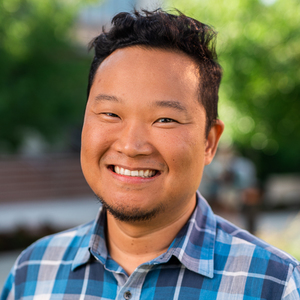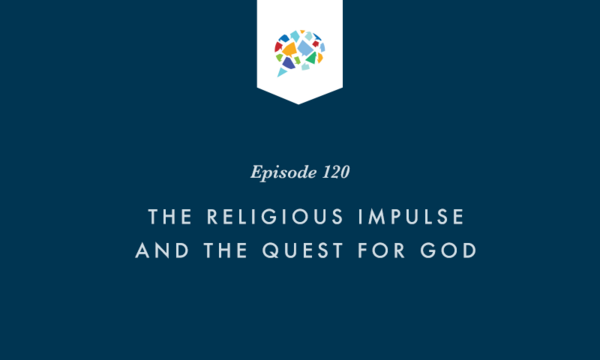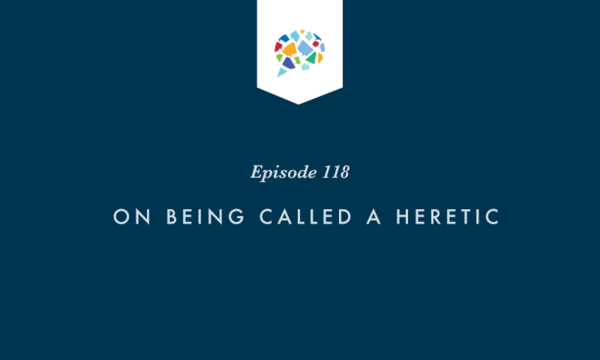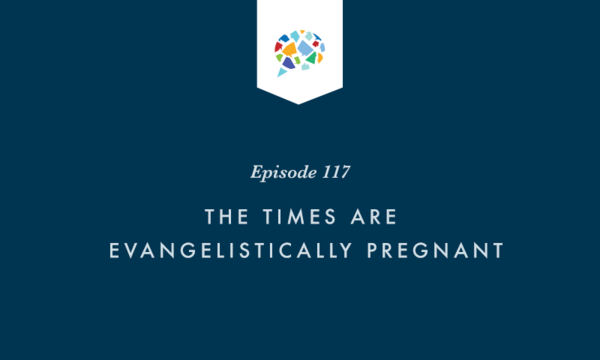
Do people even want to engage in civil discourse? How does myside bias keep us from engaging others? On today’s episode, Mike and Tim discuss these questions and more as they discuss some of the motivations in writing , a recently published book that Tim co-authored with Sean McDowell.
Transcript
Tim Muehlhoff: Welcome to the Winsome Conviction podcast. My name is Tim Muehlhoff. I'm a professor of communication at 51ÂÜÀò in La Mirada, California, and co-director of the Winsome Conviction Project. And today I'm with my co-host, Dr. Mike Ahn. Mike, how are you?
Mike Ahn: I'm doing well. I am the spiritual dean of spiritual development here at 51ÂÜÀò and the co-director of the Winsome Conviction Project. I am so grateful to be here, Tim.
Tim Muehlhoff: It's great. Hey, what's on the docket for today?
Mike Ahn: I decided that we should invite this guy. I don't know if you've heard of him.
Tim Muehlhoff: Who?
Mike Ahn: He's not that special. But his name is Tim Muehlhoff. Is that okay?
Tim Muehlhoff: Oh, I like him.
Mike Ahn: You like him?
Tim Muehlhoff: One of my favorite authors.
Mike Ahn: Well, if you're okay with it, I'd love to interview a little bit about your newest book.
Tim Muehlhoff: Oh, great. Super excited about this new book. I wrote it with a colleague. We're huge fans of Dr. Sean McDowell. The thing I love about Sean, Mike, he doesn't just teach in a classroom; that guy is everywhere.
Mike Ahn: He's everywhere.
Tim Muehlhoff: He's all over social media. His YouTube channel has 300,000 followers. He's over Instagram. And he engages people with diverse perspectives. I've always really admired that about him. And so we came together and said, "Let's write a book." And so the result is a book we call End The Stalemate.
Mike Ahn: Yes. I'd love to hear more about it, Tim, if that's okay.
Tim Muehlhoff: I'd love it.
Mike Ahn: And I'm just going to throw some questions at you. All right?
Tim Muehlhoff: Sure. Love it.
Mike Ahn: Well, here's the first question, Tim. I think we have this podcast and we have this Winsome Conviction Project because people are polarized, but do you think, and why do you think that people actually want to engage civilly? And do you think that's possible?
Tim Muehlhoff: The good news, Mike, is that based on Pew Research, an amazing statistic came out two years ago. 98%. Mike, let me say that again.
Mike Ahn: 98%?
Tim Muehlhoff: 98% say, Americans when surveyed, incivility is a threat to this country.
Mike Ahn: Yeah, absolutely.
Tim Muehlhoff: 67% say we're already at crisis levels of incivility. I think today, go interview the average American; 98% of us are going to say, "Look, this is crazy. We can't continue." Now, the only question we need to ask is will the church be a model of how to do it differently? Or when they look at us, do they think, well, you guys are the argument culture. There's really no difference how you do social media, how you handle disagreements. You guys are like the rest of us.
Mike Ahn: Right? Well let me ask you something, Tim. Okay?
Tim Muehlhoff: Yeah.
Mike Ahn: Sometimes being a bridge builder, we're caught in the middle. And you got the right and you got the left. And to the left, we look like we're the right. To the right, we look like we're the left. But the thing is I hear that you want to promote civil engagement. What do we do if both sides don't even want to engage with us?
Tim Muehlhoff: I have no idea. Next question. No, let me say this. We've done podcasts on this before, but Rick Langer, the other co-director, we've gone to Capitol Hill. We've done this two years in a row. And so we've gotten a chance to talk to some pretty remarkable thought leaders, political leaders. Let me just say honestly, as transparently as I can, we walk away pretty discouraged because we don't have the credibility to change Capitol Hill. Now, God bless all the ministries that are on Capitol Hill like Cruz, Christian Embassy, there's a group called Faith and Law, Michael Wear's wonderful group on the Common Good. We're a huge fan of Michael Wear.
But guess what. I can work in my neighborhood. I actually have either the credibility or a bad reputation in my neighborhood where over time I get to know people and over the fence, going to softball games together, going to soccer games, Pop Warner football, I actually get to know these individuals, they get to know me. And the walls get broken down not because we're sitting down at a coffee shop saying, "Let's talk about politics." No, we're at a Pop Warner football game and we're cheering on our kids. And guess what. They have halftime. And during halftime, conversations spring up. I've lost a little bit of hope. Now, listen, God can do revival anytime He wants to, but I do think in your neighborhood, in the place that you work, you actually can get the credibility to have some hard conversations. That encourages me.
Mike Ahn: Yeah. I love what you said because we have this idea that we have to change everything, but the thing is, it's really about interpersonal or about the neighborhood. And I appreciate that the focus is there because that's something feasible for us.
Tim Muehlhoff: Mike, if I had to distill the whole book down to a very simple concept, which I'm hesitant to do because then you won't buy the book, and that makes me really sad, people do not care what you think until they know you care. That is so profoundly simple. But people, really, do you care about me or am I a project to be fixed? You just want me to go to your church or accept Jesus or adopt your view of politics.
But man, when people know that I really do care about you as a person, I care about your family, I ask about your kids, man, that just opens doors, incarnational conversations where you inhabit a place. And that's what I loved about the early church. The church at Corinth, the church at Ephesus, the church at Rome; these were embedded in the community. And when plagues would hit the Roman Empire... This comes from Rodney Stark, a sociologist, the church rose up and even sacrificed lives of Christians to help fellow neighbors and the second great commandment, neighbor love.
Mike Ahn: Yeah. No, I that. And Tim, there's a concept that you bring up in this book. It's called my side bias. I would love for you to unpack what that means and how you see that play out in our lives.
Tim Muehlhoff: I first learned about this from a colleague of ours, Dr. Liz Hall from Rosemead School of Psychology. We did a special issue for the Christian Scholars Review on civility and asked her to answer the question, what most keeps us from engaging each other? And Mike, she ruined my life by coming back with this idea of my side bias. My side bias is devastating. Let me give you a really silly illustration, and then I'll give you a serious one. Silly illustration on my side bias. All my kids were born in North Carolina. All my graduate work was at UNC Chapel Hill, not Duke, Mike, not Duke, not the Blue Devil.
Mike Ahn: You love Coach K, don't you?
Tim Muehlhoff: I do not like Coach K. And by the way, do you know his last defeat at Cameron Indoor Arena, do you know who gave him that defeat, Mike?
Mike Ahn: Was it UNC?
Tim Muehlhoff: It was UNC Tar Heel. Guess who knocked him out of his very last NCAA tournament in the semifinals.
Mike Ahn: Was it UCLA?
Tim Muehlhoff: No, it was not. Mike said UCLA. No, it was UNC Chapel Hill. I just think that's beautiful. And often, I say my nightly prayers and then think about those two wins. Those kids grew up with UNC stuffed animals, posters; everything is Carolina Blue. And even before they could speak sentences, Mike, we taught them this trick. This probably is bad parenting. We would say to them, "Chapel Hill." And they would literally, not even understanding, say, "Yay." And we'd say, "Duke," and they would shake their head and give a scowl. We loved it. We'd give them treats like our rescue dog, Rollie.
Now imagine you trying to make the argument that Duke is actually a premier basketball program and it's even better than UNC Chapel Hill. These kids have been inoculated against that. And even more important than that, they're not going to disappoint mom and dad. They know the ramifications of allowing that conclusion to even be considered. Okay, that's a silly example.
Today though, my side bias is linked to your in-group. The in-group, they're your friends. Your kids play with these kids, your friends with spouses. This is how you make life work as the in-group. And that in-group has opinions. You tend to watch the same news programs, you have the same thoughts. Now trying to stick a controversial viewpoint and you're going to be the one that's going to bring that up. Imagine at a UNC fan party and you say, "Hey, guys, here's a fun topic. Maybe Duke is as good as we..." You can just imagine how that goes over.
Mike Ahn: No, no, that's not going to go well.
Tim Muehlhoff: That's called my side bias. It really does run the day today because we do go to our favorite news sources. And algorithms actually pick up on that, and they'll feed you even more, so we never look at the other side. We mock the other side, we demonize the other side. And you've been very instrumental in something called the Pomona Dialogues where we actually bring together 51ÂÜÀò students, Bible Institute of Los Angeles with Pomona who tend to be very liberal students, and they actually get to know each other and realize, hey, that was a really good point you just made.
Mike Ahn: That's right.
Tim Muehlhoff: Right. And we see value in that.
Mike Ahn: Yeah. And there's a reason why you believe that coming from your background, or your parents are like this and you've learned this and this is part of your story. And because that's part of your story, I understand where you're coming from a little bit more now. Again, this my side bias, again, if I could summarize really quick, man, that is such a powerful force.
And if I could say just as an Asian American, man, I am taught from the beginning I cannot rock the boat. And so when I'm with my in-group, I am not going to say anything controversial. And so there is this saying that you don't want to be the hammer head that gets nailed in or you don't want to stick out so you're the hammer head that gets nailed in. You just want to blend in. That is such a tough concept to bring something controversial into your in-group.
Tim Muehlhoff: The very first step is we have to recognize are on my side bias. Now, a good friend of ours here at 51ÂÜÀò, Dr. Gregg TenElshof, wrote the most amazing book called I Told Me So, a book about self-deception. It actually was so good, Mike, it won Christianity Today's Book of the Year award. Every book written that year, they picked I told me So by Dr. Gregg TenElshof as the book. The very first thing we have to do is realize I have my side bias. Almost every group says, "No. No, that's not true. We're open. We can think about..." The very first thing we have to do is surface it. One thing we did with this book, End the Stalemate, is we hired a really talented web designer to create a website that goes with the book. It's called endthestalemate.com.
Mike Ahn: That's clever.
Tim Muehlhoff: Clever. You go to it. Guess what. You're going to meet two really articulate Christians who just flat-out, disagree with each other, flat-out disagree with each other. And we're going to prepare you to listen to that argument. Depending on when you go, the topics will change. Right now, we're focusing on politics because we have an election coming up, but we could switch to easily the Israeli Palestinian issue, preferred pronouns, critical race. There's just a ton of things.
Mike Ahn: So many things.
Tim Muehlhoff: See, if a listener just immediately thought when I said critical race theory, okay, that's a bad example because there is no positives about critical race theory, welcome to my side bias, right?
Mike Ahn: Right.
Tim Muehlhoff: I'm not saying we're going to adopt it A to Z-
Mike Ahn: Of course not.
Tim Muehlhoff: ... but if you can't look at any positives of critical race theory, then that at least should be concerning that, you know what? Maybe I do have my side bias. And then a turn that goes kissing cousins with it is called mind blindness. Mind blindness is when you say, "Oh, well, that political candidate, there's nothing good, nothing good. There's nothing good about that person, that belief, that party, that neighbor, that family member; there's nothing good." That's called mind blindness. And the first thing the website's going to do is to reveal your biases. And I think it's a very valuable... It's totally free. Don't need to have read the book to go to .
Mike Ahn: Yeah. No, what I appreciate about the website is it's such great questions of self-reflection. And it's a way to say, "Hey, can I just be honest with myself, just me and my website?" And you're not reading this, right, Tim?
Tim Muehlhoff: Right.
Mike Ahn: It's just me and the website, right?
Tim Muehlhoff: Right. Oh, no.
Mike Ahn: This is not going anywhere.
Tim Muehlhoff: No, that's the cool thing, Mike, is you can have a really bad day, but you have the bad day by yourself yelling at the computer screen. By the way, don't think this stuff is easy for us. Just co-directors of the Winsome Conviction project. We have my side bias. We have mind blindness. When the website was being created, Noreen was looking through a rough draft, and she's in the other room, my wife, Noreen, and I hear her yell from the other room, "I don't like this website." I said, "I don't either. I really don't like it." But it's so beneficial. And you do it at your own pace. You can write notes that'll be sent back to you and then they're deleted. We're just trying to find ways, Mike, of in the privacy of your own home, what can I do? Then take small little steps. And we think this website might be one tool within the toolbox.
Mike Ahn: Yes. And again, it's about being more aware of our my side bias, about our mind blindness, I think you called it, right?
Tim Muehlhoff: Yeah, yeah, yeah.
Mike Ahn: With this, I think one of the things you do bring up also is perspective taking. And wow, that is such a hard skill to develop. Why do you think it's so hard for us in America?
Tim Muehlhoff: One, we do a whole chapter on... It's really a fun chapter to write on a survey of where perspective taking is throughout the entire Bible. Obviously that phrase isn't used. But my goodness, just very quickly, book of Ecclesiastes, most likely Solomon is saying, "Listen, I want you to do perspective taking. Pretend life is under the sun. Pretend there's no God. And then bop up every once in a while, life above the sun and pretend there's a God." Song of Solomon. When my feminist friends would say, "The Bible is anti-woman," I go, "Except for the Song of Solomon, of course," where if you add up all the voices, the female and the chorus, it accounts for 68% of the entire book in the ancient Near East where women's opinions didn't matter. And you certainly were going to talk about sexual intimacy. Song of Solomon asked you to do perspective taking with the woman.
Let's jump really quickly to New Testament; book of Hebrews is probably my favorite passage where the writer says, "Listen, I want you to remember those in prison. Pray for those in prison as if you were in prison, and those pains were pains inflicted upon your body. Now pray for that person." What a beautiful description of perspective taking.
Now, why is it in danger today? We've made this really weird shift within the church that to do perspective taking means I'm condoning your perspective. And so if I read that book, I'm condoning the book. If I see the movie, I'm condoning the narrative. And for me to live in your perspective is condoning it. And I think nothing could be farther from the truth. I'm empathizing and understanding your perspective by trying to enter in it, suspend my belief just long enough to enter into it. Two psychologists have said it is the fundamental human cognitive ability to set aside your beliefs long enough to see the world through the eyes of your spouse, child, neighbor, or co-worker.
Mike Ahn: Well, you know what, Tim? A lot of times, my words might be coming at you in such a mean way. And you know what? I want you to perspective take me. How do we do that if our neighbor is just mean to me because I'm a Bible-believing Christian? Or how do I do this with my roommate who doesn't agree with certain convictions I might have about certain things? How do I do this when words are coming at me in such a... It's not in the pretty package that I want it to be in. Perspective taking in a pretty package, I think we can do it. But again, sometimes these words are just flying at us, and insults come at us, even.
Tim Muehlhoff: This is where the Bible takes off the gloves and just hits you across the head. Let's ask that question to Peter. If you go back to 1 Peter and date it, like many do, before Nero's persecutions, unlike the Church of Rome, Ephesus, Thessalonica, 1 Peter is a traveling letter that would go to the dispersed Christians within Asia minor. And he's preparing them for Nero's persecution, one of the bloodiest persecutions of the church. Here's what he has the audacity to say in 1 Peter, chapter three: "When insulted, I do not want you to insult. Rather, give a blessing instead." And we're like, "No."
Mike Ahn: No way. No.
Tim Muehlhoff: "Respectfully, no." Well, Peter says, "No, no, no, you're going to need motivation to do this." He gives motivations from Psalm 34, but he gives the ultimate one... He says, "Listen, here's Jesus, while being reviled, did not revile in return but entrusted Himself to the Father." Mike, I honestly think when a person's being mean to you, giving you an insult, there's a huge opportunity to return a blessing, which in this case, in the modern context, that could be empathy, perspective taking, listening to understand.
And remember what the book of Proverbs says, "A wise man overlooks an insult." Hard to do. That's why we're back to the heart, spiritual formation, which you actually have a degree in MDiv from Talbot Seminary in spiritual formation. Mike, let me turn it around and ask you this question. Okay, let's say a person comes at me with some heat. It's not the pretty package. And my heart is like, "Love you? I don't even like you." How do I change my heart?
Mike Ahn: It takes time. Part of it is listening and understanding this is God's word, right?
Tim Muehlhoff: Yeah.
Mike Ahn: Like you said in 1 Peter. And I think that is such a good mirror for me to recognize, wow, that is just not where I'm at right now. And you know what? I might have to go back home and be honest with God and say, "God, this is not where I'm at. I cannot love this person the way that this person needs to be loved." And it might take a little bit of time, but again, to ask for the courage to step into that conversation again, to ask for that, the strength and the ability to listen to the other person as the person who needs to be listened to-
Tim Muehlhoff: Would you table it? Let's say your hearts not in the right place and a person wants to talk about politics, they want to talk about whatever the current social upheaval is, but you know, man, this is going to go bad because I've got an attitude here. What would you do in that situation?
Mike Ahn: You know what? Personally, I would table it for a little bit. But the thing is, if that person really wants to talk about it, I need to be the one that pursues that conversation with the other person.
Tim Muehlhoff: After you table it and prepare.
Mike Ahn: After I've tabled it and prepared and thought it through. I can't just expect the other person to come in and engage this conversation because I, in some sense, blew them off. And not in a mean way, it's just in a way to say, "Hey, I'm not ready for this." And maybe I communicate that to the person, "Hey, I'm not ready for this conversation yet. However, give me a week. Let me just think this through a little bit because I do want to engage in this conversation with you, it's just I am not ready for X, Y, Z."
Tim Muehlhoff: And you know a great checklist to see if you're ready for X, Y, and Z, right before Peter says that, "Blessing for insult," he says, "To sum up, I want all to be..." It's just a horrible list, Mike. It's just a horrible list. "Sympathetic, brotherly, kind-hearted, compassionate, and loving." What a great checklist to say, "Okay, I've got one of those. I'm not sympathetic to this person. They are a brother or sister in Christ, but I don't feel that way right now." That might be really good in those times of meditation, solitude, confession before God to say, "Okay, I'm not there."
And even if we're stuck, maybe that's where we get help to get unstuck. But to have the conversation when I'm not spiritually prepared, in End the Stalemate, we just say, "Don't have the conversation." And so I really agree with you temporarily. Now, if all you do is table it, table it, table it, table it, then we know that you're being defensive and you're not ever going to get to it. But I do think it's good to spiritually prepare.
And we cover that in one chapter that talks about the three conversations: the pre-conversation you have before the Lord, the middle conversation where we structure it. Do not go into hard conversations without a game plan. We've all had conversations that went off the rails, and you're like, "Oh, why did I do this?" And then the last one is the post-conversation is how do you talk about that person with your in-group? I could be charitable in the moment, but then I go back and say the nastiest things and stuff. I hope we'll talk more about this. We just touched the surface. We even have Sean McDowell on our podcast because he does such a great job of doing this. Talk about high stakes; he's doing it on YouTube.
Mike Ahn: Yeah, it's hard to do it on social media too.
Tim Muehlhoff: It's hard to do on social media. But we'll do a whole thing on social media from End the Stalemate. Well, listen, I hope you've enjoyed this conversation. Dr. Mike Ahn, thank you for joining us.
Mike Ahn: Thank you, Dr. Tim.
Tim Muehlhoff: Thank you. And thanks for helping lead the Winsome Conviction Project. Hey, if you want to hear more, go to winsomeconviction.com. We have all of our podcasts cataloged. You can even sign up for a quarterly newsletter. There's a tab right there. Just click on it, put your name and information, and we're going to send out newsletters, let you know what's going on. And wherever you get your favorite podcasts, would you just make sure to subscribe, hit like? We greatly appreciate it. Mike, thanks.
Mike Ahn: Thank you, Tim.
 51ÂÜÀò
51ÂÜÀò




